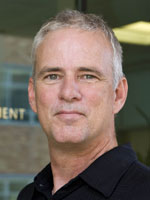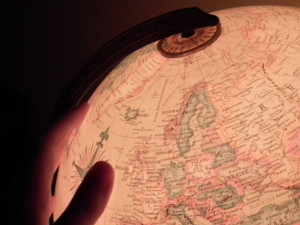The End(s) of Geography?
 Serving as your President is a singular honor, but also one that is more than a little daunting. My trepidation arises from three sources. First, with the honor of being elected President comes the responsibility to ably serve the aspirations of a wonderful, but large and highly diverse membership. Second, our past Presidents have set a very high bar of achievements against which new incumbents are sure to be measured. These are big shoes to fill. So, before I move on to my third point, allow me to thank the Members of the AAG for their confidence. I also thank our immediate past Presidents Sarah Bednarz, Mona Domash and Julie Winkler for the inspiration and warm friendship they have provided. In the end, all I can promise is that I will do my very best to serve all our Members and further the legacy of our past Presidents. What I would ask in return is that you share your ideas and experience with me. Be sure to let me know if I miss an important concern or stray off course in addressing such issues. I am very teachable.
Serving as your President is a singular honor, but also one that is more than a little daunting. My trepidation arises from three sources. First, with the honor of being elected President comes the responsibility to ably serve the aspirations of a wonderful, but large and highly diverse membership. Second, our past Presidents have set a very high bar of achievements against which new incumbents are sure to be measured. These are big shoes to fill. So, before I move on to my third point, allow me to thank the Members of the AAG for their confidence. I also thank our immediate past Presidents Sarah Bednarz, Mona Domash and Julie Winkler for the inspiration and warm friendship they have provided. In the end, all I can promise is that I will do my very best to serve all our Members and further the legacy of our past Presidents. What I would ask in return is that you share your ideas and experience with me. Be sure to let me know if I miss an important concern or stray off course in addressing such issues. I am very teachable.
Now, allow me to address the third reason why I feel a particularly strong sense of obligation in serving as President of the AAG at this juncture in the history of the Association. This revolves around the value and health of the discipline of Geography, and the very geographical perspectives it engenders. I suppose this existential question might be boiled down to — are we at “the end of geography’? In 1970 Alvin Toffler wrote explicitly about the “Demise of Geography” at the conclusion to Chapter 5 in his book Future Shock. His argument being that geography was losing any importance as people tended to move rapidly from place to place and correlations between societal diversity and place were disappearing. In the four decades since then, the continued ease of transporting people, goods and services over great distance, the explosive rise in information and communication technologies (ITC) and the myriad other phenomena encapsulated in the term globalization have prompted many others to proclaim the demise of geography, or at least wonder about the decreasing importance of space and place as significant forces in driving economic and social differences. The catch phrase ‘geography is dead’ has become a facile cliché in some corners of the ITC and globalization worlds. Works such as The World Is Flat: by Thomas Friedman (2005) and Geography is Dead: How America Lost its Sense of Direction by Brian McCabe (2012) and The End of Geography: The Changing Nature of the International System and the Challenge to International Law (2014) by Sir Daniel Bethlehem provide more nuanced and thought provoking perspectives on certain aspects of this proposition.
In the same vein one might consider the health of Geography as an academic discipline. From the dissolution of the Geography departments at Harvard, Chicago and UC Davis, the last century saw some notable losses to academic geography. In such circumstances a strong professional academic association is invaluable to unite geographers and champion the discipline. Yet we are facing a general climate of flat or declining membership in many such associations. As Denise Lee Yohn wrote recently in the Harvard Business Review (2016), professional association membership is in widespread decline in part because ICT provides online informal social and professional networking opportunities and access to content such as journal articles that negate the necessity of formal association membership. She also notes that Millennials are generally less inclined to value formal networking and organizations than earlier generations.
However, to paraphrase Mark Twain, the reports of the death of geography have been greatly exaggerated. In physical geography and across human geography from economic to cultural perspectives, geographers have demonstrated the power that space and place retain in shaping the world. Indeed, the deeper we look the more we find that many aspects of our own perceptions of the world and resulting actions are formed by our experiences of place and space. We also see how gender, race, economic status and other attributes color how we perceive and respond to differences in space and place. Some discussions and illustrative examples of the importance of geography in the context of globalization may be found in works such as Imagining Globalization by Doreen Massey (1999), The Exaggerated Death of Geography by Kevin Morgan (2004), Geographers and Globalization by Yehua Wei (2006) and Is Geography ‘Dead’ or ‘Destiny’ in a Globalizing World by Anthony Howell (2013). Realization of the critical importance of geography is currently extending well beyond the discipline. This florescence is driven by the scholarly insights provided by geographers and others working from geographical perspectives and by the geographically orientated manifestations of the ITC phenomenon in the form of Geographic Information Sciences and the proliferation of remote sensing, mapping and other spatial based applications that are delivered to us on our computers and smart phones at the flick of a finger. Academic geography programs still face challenges on some campuses, but we are arguably not in the dire straits one might have expected in the latter decades of the last century. Of note here is the fact that in 2005 Harvard established the Center for Geographic Analysis. Two years later Villanova established a new Department of Geography and the Environment. I recently spoke at the annual seminar series held by the Geography Graduate Group at UC Davis. There I met an exciting group of faculty and graduate students, from diverse academic backgrounds, but all drawn together by shared interest in geography and the perspectives it offers. I also see on my own campus and beyond the reach of geographical perspectives and techniques in the natural sciences, social sciences and humanities. Although admittedly idiosyncratic, from my perspective, interest in geography and geographical perspectives and techniques is very much on the rise in many corners of the academy. Finally, the AAG is certainly not in decline. We now have almost 12,000 members and drew some 9,000 to the recent Annual Meeting in San Francisco. We also see that a large proportion of those members are undergraduate and graduate students representing the critical Millennial generation. About 30% of our membership is drawn from outside the United States and this coupled with the variety of our annual meeting sessions and range of our affinity groups represent a staggering diversity of scholarly perspectives and pursuits.
So, my trepidation in taking up the Presidency is not about the end of geography, but rather how terribly important I feel geography and the AAG is in tackling the critical societal and environmental problems the world faces today. These challenges and the importance of geography in addressing them is driven in part by the very forces of globalization and ICT that others have assumed would lead to the end of geography. The reach of our actions extends globally as too can the actions of actors in the remotest corners of the globe. Actions from far away can reverberate directly to us wherever we are. Geographical differences in economy, culture, environment, etc., strongly influence these interactions. The more geographers look the more we find a geographically complex world. This is as true for biophysical attributes such as the genetic structure of species or micro-climatic differences as it is for cultural or economic diversity. Therefore, as geographers we know the world is not flat. Rather we recognize that we confront a world that is comprised of a dizzying array of bumps, peaks, hollows and chasms. This diverse human and environmental topography confounds easy answers to critical questions such as how we will feed a world of nine billion?; how will we support an urban population that will comprise 75% of that nine billion?; how will this population impact the environment, including the earth’s climate and how will that environment impact us?; how will all these factors as well as globalization affect human cultures?; how do we study and cope with all these challenges in an increasingly post-factual world in which the capacity and desire to embrace and support reasoned thought and rational actions is often under attack?
 Perhaps nothing illustrates the opportunities and challenges we face better than circumstances during my writing of this column. At present I have the benefit of writing on a computer designed in the United States and assembled in China. The computer is networked via fiber optics to the UCLA library system. I am, however, 400 miles away from UCLA at an elevation of just over 8,000 feet in the Sierra Nevada of California. Thanks to a small satellite dish I have been able to watch the BBC News from London while I work. What I have been watching is the vote by the United Kingdom to try and turn back the tide of globalization by exiting the European Union. Almost instantly stock markets around the world, including the Dow, plummeted in response to the potential economic and political implications. A truly globalized experience. However, within the UK the vote was strongly geographically structured with Scotland, Northern Ireland and London being against the exit. Scotland is now considering a second referendum on independence from the rest of the United Kingdom. This could split the nation along clear geographic lines. The strong exit vote in England and Wales was driven by a geographically prescribed sense of British (English largely) identity, a reaction against elites and intellectuals, disdain for increasing EU regulations, including environmental ones and fears about an influx of refugees from civil war, the depravations of ISIS, and lack of food and water in Syria and adjacent refugee camps some 2,500 miles away. None of this is understandable or will be manageable without consideration of geography. It demonstrates the forces of both global connectedness and global geographic diversity operating on multiple scales.
Perhaps nothing illustrates the opportunities and challenges we face better than circumstances during my writing of this column. At present I have the benefit of writing on a computer designed in the United States and assembled in China. The computer is networked via fiber optics to the UCLA library system. I am, however, 400 miles away from UCLA at an elevation of just over 8,000 feet in the Sierra Nevada of California. Thanks to a small satellite dish I have been able to watch the BBC News from London while I work. What I have been watching is the vote by the United Kingdom to try and turn back the tide of globalization by exiting the European Union. Almost instantly stock markets around the world, including the Dow, plummeted in response to the potential economic and political implications. A truly globalized experience. However, within the UK the vote was strongly geographically structured with Scotland, Northern Ireland and London being against the exit. Scotland is now considering a second referendum on independence from the rest of the United Kingdom. This could split the nation along clear geographic lines. The strong exit vote in England and Wales was driven by a geographically prescribed sense of British (English largely) identity, a reaction against elites and intellectuals, disdain for increasing EU regulations, including environmental ones and fears about an influx of refugees from civil war, the depravations of ISIS, and lack of food and water in Syria and adjacent refugee camps some 2,500 miles away. None of this is understandable or will be manageable without consideration of geography. It demonstrates the forces of both global connectedness and global geographic diversity operating on multiple scales.
Rather, than asking is this the end of geography, given the plethora of issues facing the world which are intrinsically tied to space and place, the real question for our discipline and our association must be – what are the ends of geography? By this I mean what are the issues that geographers have a special opportunity and responsibility to study? How can we formulate and translate our work to produce and disseminate results that are policy relevant, actionable and accessible to wider audiences both inside and outside academia? How do we recruit and educate new generations of geographers who can take up these responsibilities in the future? How, given the diversity of issues confronting us and the diversity within our discipline, do we generate coherence and build synergies in our departments and in the AAG? These are the questions I hope to address in the remaining 11 Presidential columns. There are no easy answers, but given the challenges we face and the responsibility we have as individual geographers and an association, they are questions we must tackle together. I look forward to a year of sharing my thoughts and benefiting from yours.
Join the conversation and share your views on Twitter #PresidentAAG
— Glen M. MacDonald

